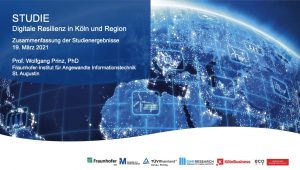- Study results: 98 % of Cologne decision-makers are satisfied with work opportunities in the home office, supply chains are stable in the crisis
- Poor resilience scores for digitalisation of education and health
- Resilience calculator enables companies and organisations to self-test their own digital resilience
“Learning from the crisis from Cologne’s decision-makers – digital resilience for the future” is the title of a German-language study on Cologne’s digital resilience published this month by the Fraunhofer Institute for Applied Information Technology FIT, Sankt Augustin, together with its partners TÜV Rheinland and deutsche ict + medienakademie. Over the past few weeks, the authors have analysed around 100 interviews with decision-makers in Cologne from SMEs and corporate groups. The study was commissioned by the German ICT & Media Institute (GIMI) e.V. with the support of KölnBusiness Wirtschaftsförderungs-GmbH and eco – Association of the Internet Industry.
The result: Digital resilience in Cologne is high, but varies greatly across sectors. Supply chains, for example, are described by 82 percent of decision-makers as being efficient even in the pandemic. The mass conversion to remote working at the beginning of the Covid crisis is also perceived as successful. Almost everything works well in the home office, say 98 percent of decision-makers, and they rate this option positively overall. Around 93 percent of the decision-makers surveyed say that employees in home offices have full access to the company network.
Offers from stationary local retailers are considered less resilient, and according to 56 percent of the Cologne decision-makers, they are more likely to come through the crisis poorly. There is still much to do in the area of cyber security. 18 percent said that employees in home offices have to take care of their Internet security themselves.
Larger companies come through the crisis better than smaller ones
“Technical challenges, such as the mass switch to mobile working, are a central building block for more resilience,” says Ekkehart Gerlach, Managing Director of the german ict and media academy Cologne. But social aspects are at least of equal importance, because informal social exchange between colleagues has declined during the pandemic.
Not only does the pandemic affect companies in different sectors differently, but the number of employees also plays a role: Around 65 percent of the decision-makers are convinced: Larger companies come through the crisis better than smaller ones, which often have some catching up to do in terms of digitalisation. The study has identified meaningful measures to improve resilience in future crises. The results of the study clearly indicate that technological prerequisites are a building block of resilience. But processes also need to be adapted accordingly, so that concepts for digital forms of work but also learning contribute decisively to reacting in a situational and adapted way in a crisis like the current one.
Need to catch up in learning situations
According to decision-makers in Cologne, there is still a lot to do in the field of digital education. Despite the very high broadband connection rate of Cologne’s schools (99 percent), the equipment with tablets and whiteboards is only around the average for the federal state of North Rhine-Westphalia (NRW), but with very large differences across city districts and school types. The decision-makers in Cologne are rather dissatisfied with the impact of the pandemic on the health sector. Around 45 percent describe the aspects of security of patient records as rather poor. As many as 82 percent are dissatisfied with the digital networking of the relevant institutions, such as offices, doctors and hospitals.
“To make societies resilient, it is crucial to pay equal attention to technological and social aspects,” says Ekkehart Gerlach. Resilience is the ability to resist, prepare for, anticipate, cope with, recover from and adapt to actual or potentially adverse events with increasing success. To promote this, the study authors have published a resilience calculator (only available in German). In this, managers and business-owners can answer around 40 questions and determine their own digital resilience.




